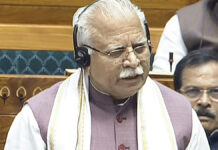National Conference Vice President Omar Abdullah was sworn in as the first Chief Minister of the Jammu and Kashmir Union Territory on October 16, 2024. The oath of office and secrecy was administered by J&K Lieutenant Governor Manoj Sinha during a high-profile ceremony at the iconic SKICC, situated on the scenic banks of Dal Lake in Srinagar. As the new Chief Minister, Omar Abdullah dons the ‘Crown of Thorns,’ facing a daunting task amid a complex administrative setup and ongoing security challenges in the region. While governing in J&K has always been difficult, the current circumstances significantly heighten these challenges. The responsibilities ahead extend far beyond conventional governance, requiring a nuanced approach to effectively address the region’s unique complexities. Notably, the Centre has vested more powers in the Lieutenant Governor (LG) of Jammu and Kashmir for decision-making on critical matters, including control over the police, officers of all-India services such as the IAS and IPS, and the authority to grant sanctions for prosecution in various cases. The LG also oversees appointments of the advocate general and other law officers, as well as issues related to the Anti-Corruption Bureau. These powers were assigned through amendments made by the Union Home Ministry under the Kashmir Reorganisation Act, 2019, following the bifurcation of the erstwhile state into Union Territories of Jammu and Kashmir and Ladakh, alongside the abrogation of Article 370. One of the most significant hurdles stems from the new administrative framework established after the abrogation of Article 370 on August 5, 2019. Unlike previous state governments, the new Chief Minister will have limited control over the police force, which remains under the direct jurisdiction of the Union Home Ministry. This structural change poses a dilemma, particularly when addressing security concerns and the persistent threat of terrorism. In this scenario, the new government will need to rely on central directives and coordination with security forces, with limited autonomy to act independently. However, the road ahead is fraught with challenges. One of the most enduring and sensitive issues is the deep-rooted divide between the aspirations of people in the Kashmir Valley and those in the Jammu province. Over the years, successive governments have struggled to bridge this gap, leading to a pervasive sense of discrimination on both sides. Addressing these regional disparities without alienating either community will require deft political acumen. Past administrations have often been accused of bias, and any perceived lopsidedness in policies could reignite these grievances, potentially destabilizing the region. There are also expectations that the new government will usher in major development projects and boost essential infrastructure across J&K. However, achieving this while maintaining a delicate balance between the regions will be no easy feat. Decisions that appear to favor one area over another could trigger unrest, especially in a region where prejudices have long simmered. Ultimately, the success of this new government hinges on its ability to foster a sense of inclusivity and equity. While development is a priority, it must be pursued in tandem with efforts to heal the existing rifts between Jammu and the Valley. Effective coordination with the Centre will be vital, as J&K navigates its new administrative status under the Union Territory framework. Striking this balance will be essential for Omar Abdullah’s administration to run the affairs of this complex region successfully.

Dogra Herald is the media of J & K, breaking language and geographical barriers, connecting J & K to the rest of India.
0191 245 4946
info@dograherald.com
Latest articles
Defending champion PG Department retains title
iamjkstarr - 0
Defeating Government College for Women (GCW) Parade by 24 points (40-16) in the summit clash, PG Department lifted the title trophy of the Inter-Collegiate...
Oxygen Express with highest volumes of LMO arrives Delhi
iamjkstarr - 0
NEW DELHI: Indian Railways on Monday informed that Oxygen Express carrying around 225 MT of oxygen from Gujarat's Hapa will be offloaded...
CS assesses promotion plans for Handicrafts, MSMEs in J&K
DOGRA HERALD BUREAUSRINAGAR, June 11Chief Secretary, Atal Dulloo, today had an overview of the prospective plans for large scale promotion of Handicrafts...


























